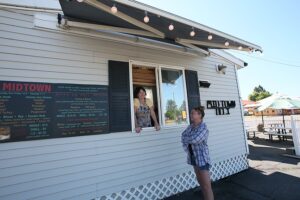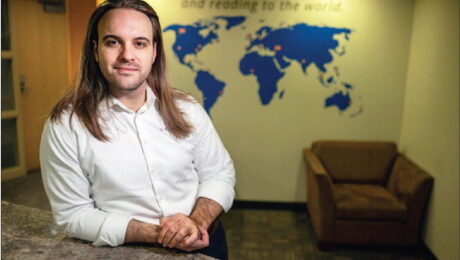The biotech and healthtech community in Eastern Washington has a loyal base of startups that laud their local connections and the support of a tight-knit group of entrepreneurs.
That’s a message echoed by several of the region’s CEOs and founders recently at the East West Life Science Summit, a meeting sponsored by industry group Life Science Washington.
“We have long-standing relationships and community built in this region that allows innovators to advance ideas and network and connect in a way that you just don’t get in more urbanized areas,” said Georgina Lynch, co-founder of Appiture Biotechnologies, which is developing ways to diagnose autism by measuring light reflexes in the eye. She is also an assistant professor at Washington State University Elson S. Floyd College of Medicine in Spokane.
Appiture is one of several startups in the region fostered by WSU’s tech transfer office — though not all WSU spinouts stay.
Well before its public offering last year, WSU neurosciences spinout Athira Pharma made the move to the Seattle area, as has Cancer Targeted Technology, which is developing diagnostics and therapeutics for prostate cancer and has a licensing deal with pharma giant Novartis.
But companies that stay are rewarded with a lower cost of living for their workers and a stable employee base in a region with a less hectic pace of living than larger cities, said Shade Needham at the meeting.
“Once somebody finds the right position they don’t leave, and so there’s very low turnover,” said Needham, who owns Alturas Analytics, a contract research organization that performs chemical analyses for drug companies. The company is located in Moscow, Idaho, adjacent to the Washington border.

Proximity to Seattle and the region’s recreational options are also luring an increasing number of tech companies to Spokane, such as Seattle-based pet company Rover, which has an outpost in the city.
Tech activity bolsters the larger startup ecosystem in the Spokane region, an area of about 500,000 people. Startups can tap into institutions such as Greater Spokane Incorporated, a business development organization, Startup Spokane, and the Health Sciences and Services Authority of Spokane County, a Washington state-funded group that issues grants to the life and health sciences research industry.
Last December, WSU launched a Spokane-based incubator for early stage life sciences companies. Spinout Space in Spokane (sp³nw) provides lab and office space for startups including H Source, a marketplace for hospitals to buy and sell medical products from each other, and clinical genetic testing company Allele Diagnostics.
Startups have also been buoyed by early stage funders in the region such as entrepreneur Tom Simpson, who sold his e-commerce company Etailz for $75 million in 2016. He has backed dozens of Spokane-area startups as CEO of Ignite Funds and president of the Spokane Angel Alliance.

Since 1921, Spokane has been home to a company now called Jubilant HollisterStier that is manufacturing components for COVID-19 vaccines. The contract research organization is a subsidiary of global company Jubilant Pharma.
Eastern Washington has the talent pool and early-stage funding opportunities to support more life sciences growth, said meeting attendees.
“You can get very well connected here very quickly,” said Parrots CEO and founder David Hojah. Hojah received funding from Simpson and other backers to launch his eight-employee startup developing assistive technologies for people with multiple sclerosis and other conditions. Parrots also recently won second place at a Novartis-sponsored competition for its tech device to support vision, which looks like a parrot.
Hojah previously lived in Boston and recently moved to Spokane from Seattle. So far, his impression is positive: “It’s the connection, the people, the vibes and the energy.”
Several other Spokane-area companies were highlighted by speakers at the summit.
-

Swabbing a dog for a genetic test. (Paw Prints Photo) Paw Print Genetics services dog breeders and veterinarians with nearly 300 genetic tests for over 350 different dog breeds. Founder and CEO Lisa Shaffer received an undergraduate degree from WSU and returned years later as a genetics professor. She co-founded Signature Genomic Laboratories, a Spokane-based genetic testing company for children with developmental disabilities that sold for $90 million in 2010. Paw Print, founded in 2012, had 40 employees in 2020 and was growing.
- Medcurity makes it easier for healthcare organizations to comply with federal privacy and security laws through an online series of queries resembling Turbotax. Last summer the startup raised $500,000 from Seattle’s SeaChange fund, on the heels of $737,00 from Washington Research Foundation.
- Photon Biosciences leverages its technology for ultra-sensitive imaging of biological materials and is developing an at-home test for contamination of blood platelet donations. The WSU spinout has landed grants from the U.S. National Institutes of Health totaling $415,000, matched locally by the Health Sciences and Services Authority of Spokane. CEO Chandima Bandaranayaka previously rose from research intern to business development manager at VMRD, a 40-year-old Pullman-based diagnostics company.
- S2 Media manufactures and sells materials for culturing microbes. In 2019 the company secured $750,000 in funding from “local investors” to expand production in its 5,000-square-foot operation. The company was founded in 2015 by microbiologist Stephanie Bernards, who has a master’s degree from Eastern Washington University and is a former quality assurance manager at Jubilant HollisterStier.
- Crimson Medical Solutions is led by co-founder Stephen Bone, who graduated from WSU in 2020 with a bachelor’s degree in bioengineering. Crimson is making an organization system for IV lines to reduce medical errors. The three-employee, three-intern company has received grant funding from Greater Spokane Incorporated.













